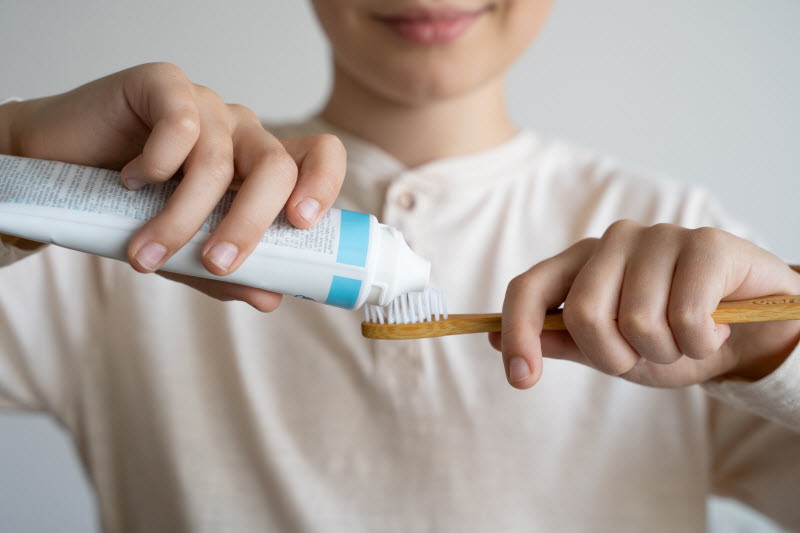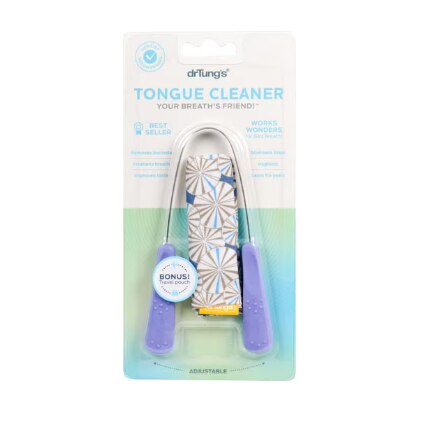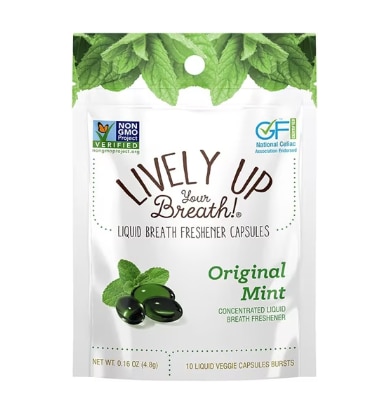Have you ever noticed how you can’t get rid of that strong odor after you’ve eaten a garlic or onion-laden meal, even after a mint or even brushing your teeth? That pungent smell seems to emanate from your pores! That’s because garlic and onions start to break down in your mouth, leaving behind a foul-smelling sulfur compound that eventually gets absorbed into your bloodstream and then moves into your lungs.
So, while a mint or toothpaste can mask the taste in your mouth, you, and those beside you, will still smell the garlic because the odor is coming from the air you exhale. The smell doesn’t fully subside until your food has passed through your system.

In addition to garlic and onions, cheese, orange juice and pastrami are foods and beverages that can wreak havoc on your breath. But food is only one of the culprits when it comes to bad breath.
What causes bad breath?
The leading cause of bad breath is a buildup of bacteria in your mouth. That’s why your main defense against halitosis is regular brushing and flossing. If you don’t, food particles stick around between your teeth and on your tongue, encouraging bacterial growth in your mouth, around your gums, and on your tongue.
Eventually, this growth around your gums can lead to gingivitis, inflammation of the gums, which can also cause bad breath. Other causes of bad breath include:
Smoking and tobacco product use
Smoking itself leaves a nasty smell on your breath (and clothes and hair). It also increases your risk of developing gum disease.
Dry mouth
Saliva helps rinse away food particles that can lead to bacterial growth. Most of us experience dry mouth in the morning, especially if you sleep with your mouth open, which is why “morning breath” is a universal issue. Some people may have a medical condition called xerostomia, which is chronic dry mouth. Additionally, beverages that dehydrate you, like coffee and alcohol, are associated with bad breath.
Dental issues
Cavities, mouth sores and gum disease can all leave a bad taste and bad breath in your mouth. Additionally, poor-fitting or poorly cared-for dental appliances can also contribute to smelly breath.
Certain weight loss diets
Diets such as the keto diet or any diet that greatly restricts carbs can help you lose weight, but maybe also some friends because of what they do to your breath. When you restrict carbs, your body turns to fat-burning for energy. This is good for your waistline but bad for your breath because fat burning, or ketosis, causes your body to release certain chemicals that, well, stink.
Other health issues
Bad breath can be caused by certain health issues such as acid reflux and diabetes, and also a sign of a health issue. Other health issues associated with halitosis include respiratory or sinus infection, allergies, liver or kidney disease, and certain cancers.
How do you know if you have bad breath?
Although bad breath is common, it’s not something people usually talk or tell you about. Instead of sharing that you have bad breath, a friend may stand back a bit while you talk or avoid standing too close. A review of 13 studies found that about a third of the population experiences lousy breath.
If you suspect you have stinky breath, you can ask a trusted friend. Or, according to the Oral Health Foundation, a simple trick you can try is to lick your wrist. If it smells bad, then chances are your breath does as well.
Natural bad breath solutions
Fortunately, with some effort, you can eliminate bad breath and not have to worry about turning people off or away. First, as mentioned above, the easiest and most effective way to combat off-putting breath is to brush your teeth twice a day and floss at night. Brushing after meals is also a good idea. Additionally, you should brush or scrape your tongue to get rid of bacteria and other odor-promoters that can build up there and often get overlooked.
Other ways to keep your breath fresh include:
Keep your whistle wet
Avoid dry mouth by drinking plenty of water throughout the day. Water keeps your mouth moist and washes away food particles.
Candy and gum
Sucking on a piece of sugarless candy or chewing on a piece of sugarless gum can stimulate saliva production. It also helps wash away food and bacteria.
Swap out your toothbrush every three to four months
It’s not enough to brush at least twice a day. You need to make sure the toothbrush you’re brushing with is clean and bacteria-free.
Visit your dentist regularly
Your dentist can examine your mouth for gum disease and other issues that can contribute to bad breath. Additionally, a professional dental cleaning helps ensure a bacteria and plaque-free mouth.
Eat this and not that
In addition to avoiding odor-producing foods such as garlic, onions and coffee, you should try to consume foods that minimize odor. Heard fruits and vegetables like apples, carrots, peppers, and celery help wash away plaque and food particles from your mouth.
Quit smoking
There are numerous reasons why you should quit smoking and using tobacco products. If reducing your risk of cancer and heart disease are not strong enough reasons, consider giving it up to save your breath.
Many of these odor-beating tips can not only improve your breath, but also your dental health, and overall health, and make you more pleasant to kiss.
Featured Products



The post What Causes Bad Breath? Some Common Culprits – and Strategies to Keep Your Mouth Fresh All the Time first appeared on The Upside by Vitacost.com.

